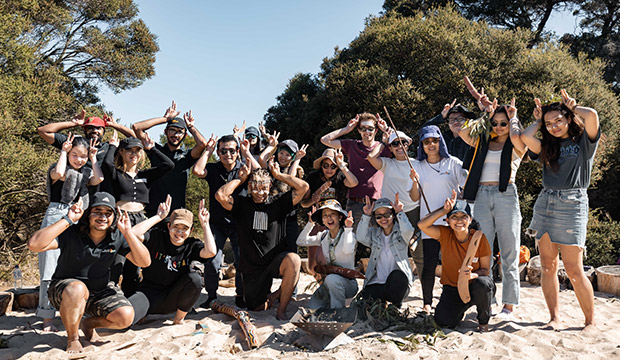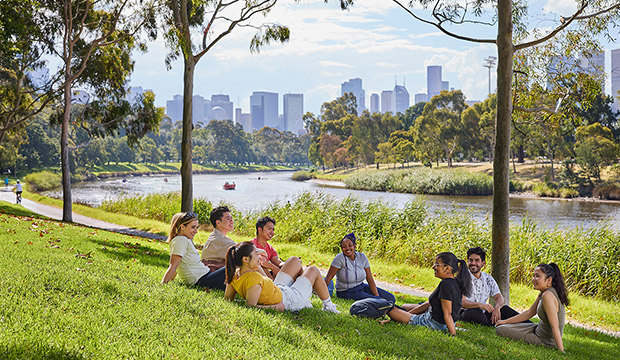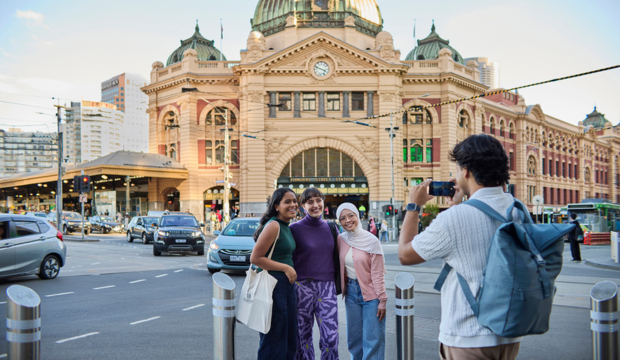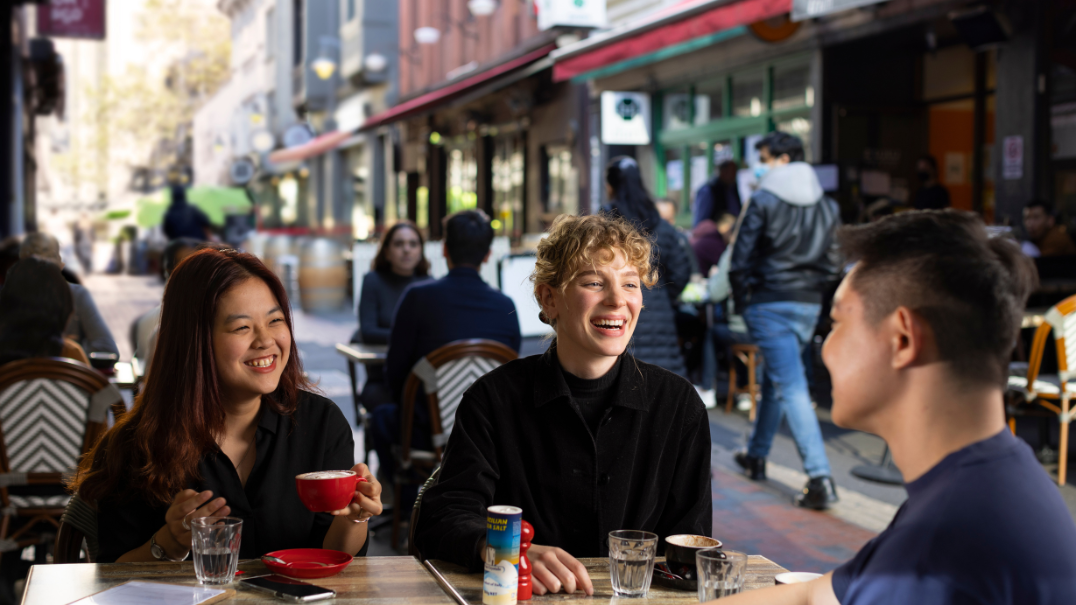Your health is your most important asset. As an international student, it’s vital to prioritise yourself and take care of your physical and mental wellbeing.
By maintaining your overall wellness, you’ll be better able to strike a healthy work-life balance , which is key to making the most of your international study experience.
How to maintain a healthy lifestyle
Plan ahead
Having a schedule can be a great way to reduce stress and sustain a balanced lifestyle.
If you can, make a study plan at the start of the study term, allocating time for revision and assignments, as well as time for relaxation and socialising with friends.
Not sure where to start? There are many platforms that can help. Trello is an easy-to-use platform that allows you to organise your tasks in boards. Plus, you can use it independently or with others, making it ideal for group assessments. The myHomework Student Planner is also extremely useful. The app offers a calendar that you can use to track upcoming assignments, exams and other important events.
Eat well
A balanced diet not only provides the nutrition and energy that your body needs, but it helps your brain, too. Research has shown that a healthy diet can protect important cognitive functions, like memory and concentration, and can even reduce feelings of stress.
Try to enjoy a range of fresh, wholesome foods throughout your week. You could even buy or prepare a few healthy frozen meals before busy periods like exam time. This will make it easy to enjoy a delicious and nutritious meal when you’re tight on time.
Check out budget-friendly recipes as well as cheap eats in Melbourne to eat well without overspending.
If you want to enjoy a free meal and make new friends at the same time, visit The Couch International Student Centre, a safe and fun place, open 6pm to 8.30pm, Monday to Thursday.
Stay active
Physical activity is one of the best tools to take care of your overall health and wellbeing. Exercise offers several benefits for your body and mind, including improving our brain function, mood, fitness and heart health.
Whether you join a gym or group fitness class, get involved in social sports or even just head outside for a brisk walk or run, making movement a part of your routine will help you make the most of your study experience.
Staying active is made much easier thanks to the range of recreation centres across Melbourne.
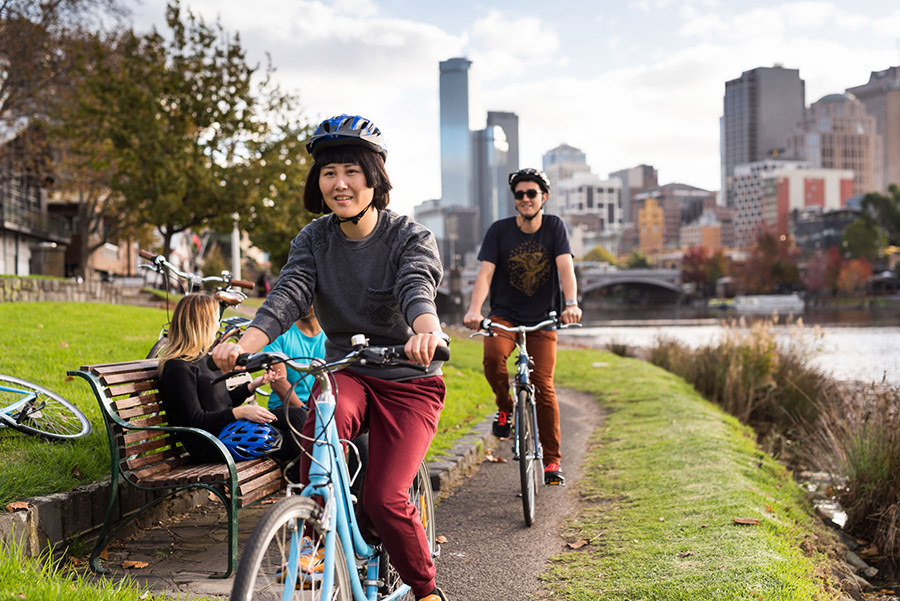
Get outdoors
When you’re busy with studies, it can be easy to forget the outside world. However, a little time in the fresh air and sunshine can improve your mood, reduce stress and boost your energy, making you healthier, happier and more productive.
During busy periods, just a few minutes of walking in a nearby park can help you feel more grounded. If you have a bit more time, why not gather some friends and explore one of Victoria's stunning national parks or walking and hiking trails?
Get enough sleep
It can sometimes be challenging to get enough sleep, especially during exam season. However, getting plenty of high-quality rest is essential for your wellbeing.
According to the Sleep Health Foundation, young adults aged 18 to 25 should aim to get 7-9 hours of sleep per night. Try your best to head to bed early enough to allow for a full night’s sleep. If you find it difficult to drop off, it might be useful to work on your sleep hygiene.
There are also plenty of apps you can check out that can help you unwind. Calm is a meditation and sleep app with features such as guided meditations, sleep stories, music and masterclasses to promote a happier, healthier life. Insight Timer is another great app that offers sleep-focused meditations and the capacity to create customised sleep routines.
Socialise
Human beings are social creatures, so it’s important to make time to meet and connect with other people. Maintaining friendships and social connections has been shown to improve mental health, self-image and empathy.
View transcript
[On-screen text: Susie, International student, visuals of Susie at an outdoor cafe]
Speaker, Susie: One of the best parts of being an international student is all of the new and incredible people you'll meet. Whether they are other students, teachers who help to fuel your drive to learn, or professionals who can mentor and support you, meeting people and building networks is essential to make the most of your time in Victoria. Now let's talk about making friends. [Visuals of Susie taking a group selfie on the bay with friends with city skyline in background, palm trees on the bay]
Susie: You'll definitely be mingling with other people in your course, but you need to be proactive when it comes to making meaningful connections. It can be a bit intimidating at first, but putting yourself out there is the key when it comes to making friends. There are many events and activities available to international students through Study Melbourne. These can help you socialise and make friends. [Visuals of Susie and friends with iced drinks sitting on the grass, bay in the background, in a restaurant, out the front of Luna Park]
Susie: Connect with Study Melbourne through social media, sign up to the newsletter or check out the events page on the website for announcements for upcoming events. [Visuals of tram and Flinder's Street Station, Study Melbourne networking event]
Susie: One of the best ways for you to engage with fellow students is through one of Study Melbourne's programs. These programs are specifically developed for international students to support you in building your employability, leadership, and digital skills, while helping you engage with the local community and enhance your experience in living and studying in Victoria. No matter which event you attend - and you can attend them all - these are the perfect first step for you to meeting new people and making friends. [Susie walking down a vibrant street with friends, playing Jenga, taking photos of food]
Susie: Make sure to also check out your institution’s student clubs, societies, and sports teams. There will be groups of people with similar hobbies, interests, languages, and culture. [Visuals of lantern festival at the Study Melbourne Hub, group jigsaw puzzle]
Susie: Alternatively, check out the community groups near where you live, like the local library or simply head to Study Melbourne Hub on Hardware Lane and start a conversation with new students over a cup of coffee.
[End transcript]
Family Relationships
Living away from home can present new opportunities as well as challenges. As an international student, it can sometimes be stressful making decisions about the information you share with your family back at home and it can highlight differences between young and older people. Some students talk about their personal issues with family, and others choose not to.
Regardless of your situation, it is very common to miss friends and family from your home country. Getting advice from other international students can be helpful. Staying socially connected is an important aspect of wellbeing. Making time to build relationships with those around you, is an important investment in your happiness.
Make a conscious effort to connect with your loved ones. Send a message when you’re thinking of them, share pictures of your day-to-day routine and hop on video calls during your downtime. For an added bit of fun, try hosting a virtual game night. From Codenames to Drawful to Quiplash, there are countless online games to suit every interest.
You may also want to check out the social events, clubs and organisations on offer at your educational institution, as these are excellent places to meet new people. Learn more about the groups and communities in Victoria.
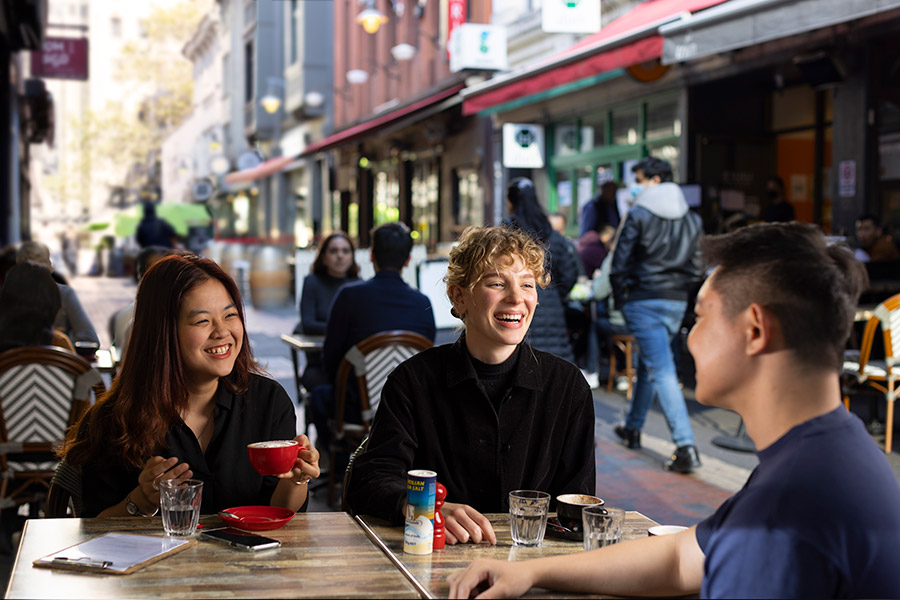
Stress
Most international students will experience stress. Even if you’ve moved to Australia and expected challenges, you can’t always anticipate what it will be like to manage study as well as your finances, transportation, and housing.
While managing challenges can lead to feelings of resilience, too much stress can have a negative impact your health. There are services available to support you.
Signs of stress to look out for
Everyone experiences stress differently, but there are some common signs to look out for. These include:
- Feelings of anger, irritability, nervousness or fear
- Feeling overburdened and/or overwhelmed
- Racing thoughts or excessive worry
- Finding it hard to enjoy your life and losing interest in activities you used to enjoy
- Difficulty focusing
- Impatience
- Fatigue and/or difficulty sleeping.
Some people may also experience physical symptoms of stress, such as tense muscles, headaches or nausea.
How to manage your stress
Setting aside a few minutes each day to care for your mind is a great way to manage your stress and keep your mental health in check. There are several apps that can help you do this.
Headspace teaches you how to relax, find your focus, and release tension in both the mind and body.
If you’re struggling with depression or thoughts of self-harm, you may want to explore Beyond Now, an app created Beyond Blue to support people experiencing suicidal thoughts. On this platform, you can create a safety plan to help reduce the intensity of these thoughts and increase your ability to cope with them.
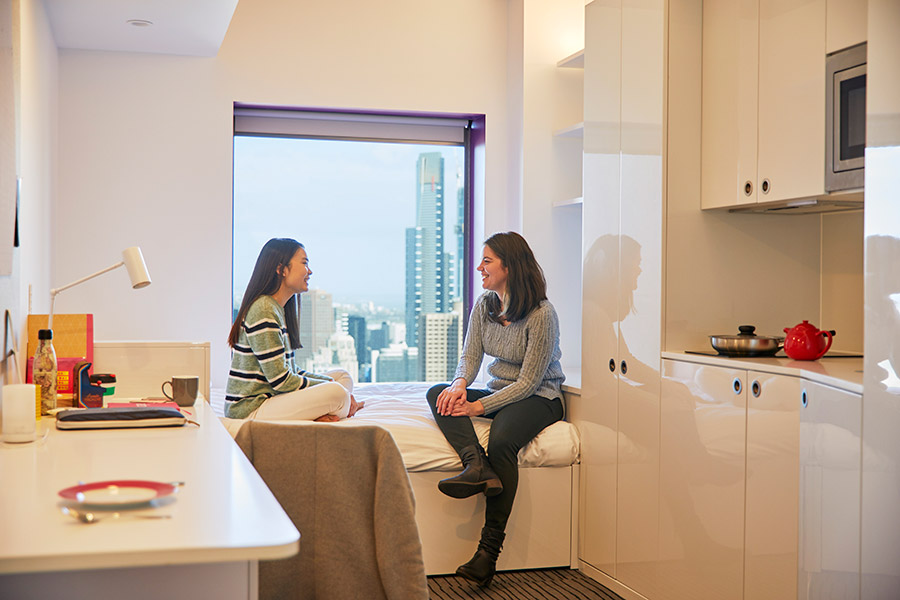
Seeking health services in Melbourne and Victoria
If you need some health assistance, there are plenty of places to turn.
If you’re feeling physically ill (but don’t require immediate, urgent care), we recommend visiting your local doctor, sometimes called a general practitioner or GP. A GP can help diagnose and treat common illnesses and injuries, like the cold, flu and minor burns.
No matter where you are in Victoria, you’ll find it easy to locate a GP. In many cases, your Overseas Student Health Cover (OSHC) provider can help you find a GP in your network. Alternatively, you can use sites like Healthengine or Healthdirect to search for a medical practice near you.
Can’t make it to a doctor in person? The Victorian Virtual Emergency Department (VVED) is an excellent resource to check out, providing virtual care in non-life-threatening emergencies. Interpreter services are even available through VVED for patients who prefer to speak in their own language.
If you want some support with your mental health, a GP can refer you to a qualified psychologist, psychiatrist or counsellor.
Mental health services - such as psychiatric care or mental health care plans - are often covered by OSHC. However, every provider is different and there may be waiting periods associated with certain services. Check your plan or get in touch with your insurance provider to see what’s covered.
To speak to someone about your sexual or reproductive health, get in touch with your GP or contact Sexual Health Victoria.
For information on emergency medical support services - including mental health emergencies - consult our Medical and emergency services page.
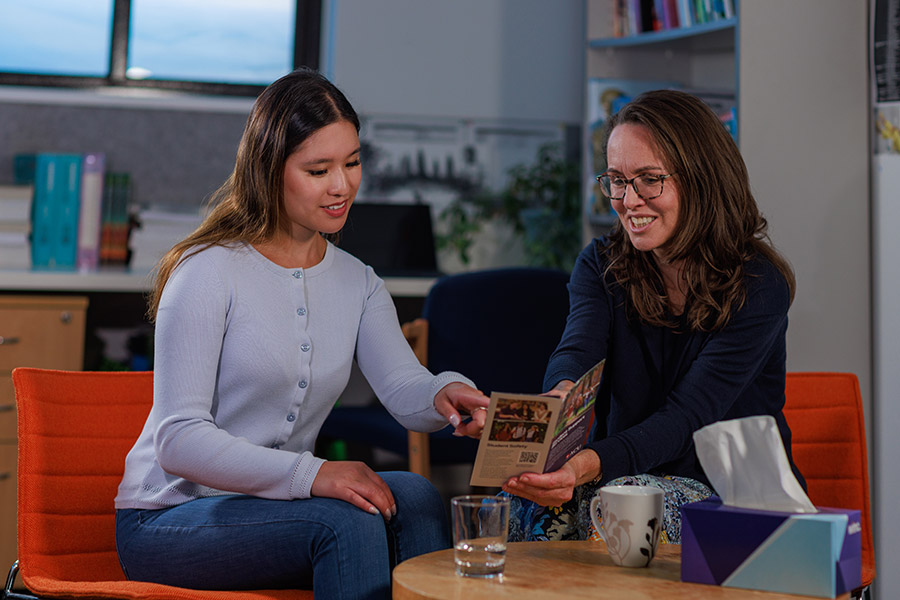
Seeking support from Study Melbourne
Study Melbourne is here to make sure your time in Australia is as great as it can be.
Check out our work-life balance resources , which are full of tips and advice to help you get the most out of your international student experience. Here, you’ll find guides on everything from staying active to making new friends.
The Study Melbourne Hub is another great resource. The friendly team at the Hub can help point you in the direction of health and wellbeing resources. Plus, with regular social events, workshops and activities, you can connect with your local community and get tips for taking control of your wellbeing.
Page last updated:

